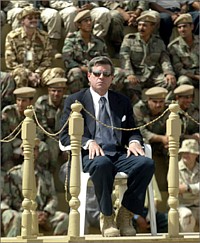Anti-corruption official in Iraq accused of fraud
 J. Paul Bremer ran Iraq for the United States as head of the Coalition Provisional Authority (CPA) until his departure on June 28, 2004. The Commission on Public Integrity is a holdover from his time.
J. Paul Bremer ran Iraq for the United States as head of the Coalition Provisional Authority (CPA) until his departure on June 28, 2004. The Commission on Public Integrity is a holdover from his time.Iraq's top anticorruption watchdog, a high-profile judge whose efforts have been hailed by Americans as one of the few bright spots in the country, is himself the target of a corruption probe, officials said Saturday.
Judge Radhi Radhi, head of Iraq's Commission on Public Integrity, is under investigation by court authorities, accused of turning his 1,700-employee agency into a personal fiefdom and padding his salary with an extra $50,000 a year.
Radhi denies the charges, arguing that they're part of a campaign of intimidation by government officials to quash his investigations, which include examinations of corruption in ministries controlled by Iraq's dominant Shiite Muslim parties.
He said he has come under pressure to shut down his commission or cede its independent status. The government has ignored his requests for information, threatened his legal mandate and demanded he halt his investigations, said Radhi, who is a Shiite, but secular.
"They tell me, 'You are not a ministry to be giving us orders,' " he said in an interview Saturday. "There are voices among them who say there is no need for this commission."
Lawmakers have threatened not only to remove Radhi from his post for alleged incompetence, but to prosecute him for corruption, as detailed in an Oct. 29 affidavit submitted to the Supreme Judicial Council.
"I don't want him to be just removed from his post, I want him to be punished according to the law," said Sheik Sabah Saadi, a Shiite lawmaker who heads the parliamentary anti-corruption committee and has spearheaded the efforts against Radhi. "We have found financial and administrative corruption inside the integrity commission."
Transparency International, a Berlin-based organization that monitors official graft, patronage and bribery, lists Iraq as the world's third most corrupt nation, behind Haiti and Myanmar.
U.S. officials have hailed Radhi's work. He has pushed for the prosecution of several former ministers and uncovered corruption in the Interior Ministry, which has been infiltrated by Shiite militias. His targets have included former Defense Minister Hazem Shaalan and former Electricity Minister Ayham Sameraei.
Radhi has worked closely with Stuart W. Bowen Jr. of the Special Inspector General for Iraq Reconstruction, a U.S. agency created to investigate waste and fraud by U.S. officials and contractors in Iraq. That agency's legal mandate has run out, and it may soon be folded.
The integrity commission, too, rests on precarious legal ground. It was created by an order of an American, L. Paul Bremer III, head of the former Coalition Provisional Authority, and has never been written into Iraqi law. Iraqi legislators have stalled a vote on whether to give the commission permanent status or dissolve it and let government inspectors audit their own agencies.
Read the rest at the LA Times

<< Home